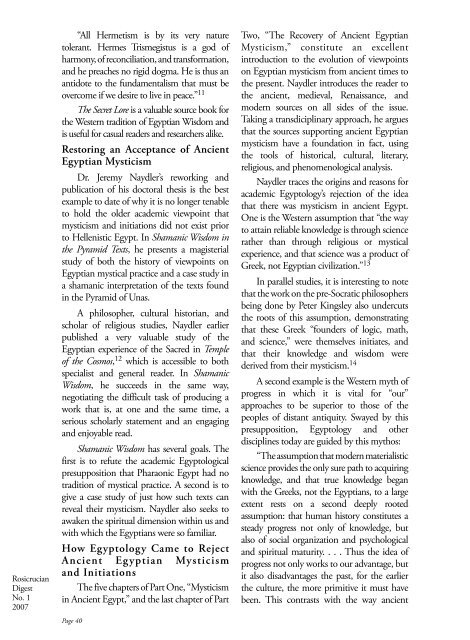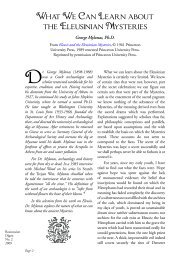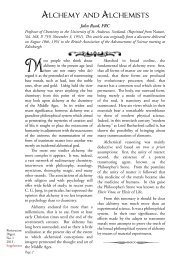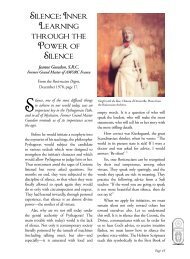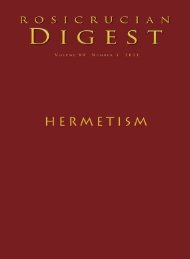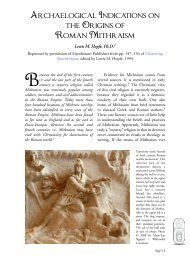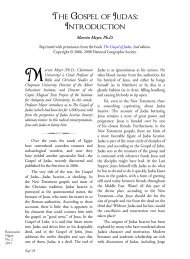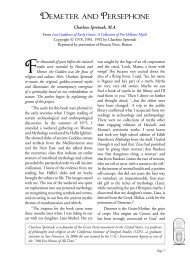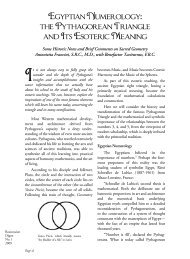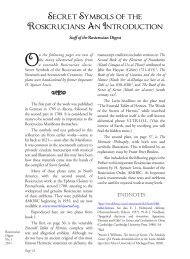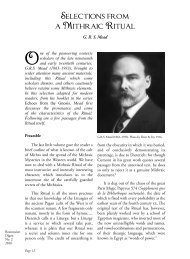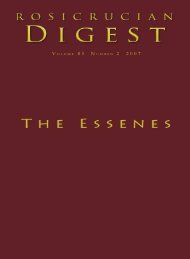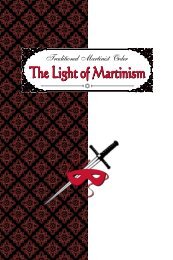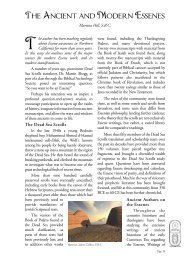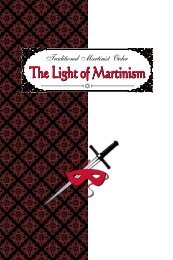Digest - Rosicrucian Order
Digest - Rosicrucian Order
Digest - Rosicrucian Order
You also want an ePaper? Increase the reach of your titles
YUMPU automatically turns print PDFs into web optimized ePapers that Google loves.
<strong>Rosicrucian</strong><br />
<strong>Digest</strong><br />
No. 1<br />
2007<br />
“All Hermetism is by its very nature<br />
tolerant. Hermes Trismegistus is a god of<br />
harmony, of reconciliation, and transformation,<br />
and he preaches no rigid dogma. He is thus an<br />
antidote to the fundamentalism that must be<br />
overcome if we desire to live in peace.” 11<br />
The Secret Lore is a valuable source book for<br />
the Western tradition of Egyptian Wisdom and<br />
is useful for casual readers and researchers alike.<br />
Restoring an Acceptance of Ancient<br />
Egyptian Mysticism<br />
Dr. Jeremy Naydler’s reworking and<br />
publication of his doctoral thesis is the best<br />
example to date of why it is no longer tenable<br />
to hold the older academic viewpoint that<br />
mysticism and initiations did not exist prior<br />
to Hellenistic Egypt. In Shamanic Wisdom in<br />
the Pyramid Texts, he presents a magisterial<br />
study of both the history of viewpoints on<br />
Egyptian mystical practice and a case study in<br />
a shamanic interpretation of the texts found<br />
in the Pyramid of Unas.<br />
A philosopher, cultural historian, and<br />
scholar of religious studies, Naydler earlier<br />
published a very valuable study of the<br />
Egyptian experience of the Sacred in Temple<br />
of the Cosmos, 12 which is accessible to both<br />
specialist and general reader. In Shamanic<br />
Wisdom, he succeeds in the same way,<br />
negotiating the difficult task of producing a<br />
work that is, at one and the same time, a<br />
serious scholarly statement and an engaging<br />
and enjoyable read.<br />
Shamanic Wisdom has several goals. The<br />
first is to refute the academic Egyptological<br />
presupposition that Pharaonic Egypt had no<br />
tradition of mystical practice. A second is to<br />
give a case study of just how such texts can<br />
reveal their mysticism. Naydler also seeks to<br />
awaken the spiritual dimension within us and<br />
with which the Egyptians were so familiar.<br />
How Egyptology Came to Reject<br />
Ancient Egyptian Mysticism<br />
and Initiations<br />
The five chapters of Part One, “Mysticism<br />
in Ancient Egypt,” and the last chapter of Part<br />
Page 40<br />
Two, “The Recovery of Ancient Egyptian<br />
Mysticism,” constitute an excellent<br />
introduction to the evolution of viewpoints<br />
on Egyptian mysticism from ancient times to<br />
the present. Naydler introduces the reader to<br />
the ancient, medieval, Renaissance, and<br />
modern sources on all sides of the issue.<br />
Taking a transdiciplinary approach, he argues<br />
that the sources supporting ancient Egyptian<br />
mysticism have a foundation in fact, using<br />
the tools of historical, cultural, literary,<br />
religious, and phenomenological analysis.<br />
Naydler traces the origins and reasons for<br />
academic Egyptology’s rejection of the idea<br />
that there was mysticism in ancient Egypt.<br />
One is the Western assumption that “the way<br />
to attain reliable knowledge is through science<br />
rather than through religious or mystical<br />
experience, and that science was a product of<br />
Greek, not Egyptian civilization.” 13<br />
In parallel studies, it is interesting to note<br />
that the work on the pre-Socratic philosophers<br />
being done by Peter Kingsley also undercuts<br />
the roots of this assumption, demonstrating<br />
that these Greek “founders of logic, math,<br />
and science,” were themselves initiates, and<br />
that their knowledge and wisdom were<br />
derived from their mysticism. 14<br />
A second example is the Western myth of<br />
progress in which it is vital for “our”<br />
approaches to be superior to those of the<br />
peoples of distant antiquity. Swayed by this<br />
presupposition, Egyptology and other<br />
disciplines today are guided by this mythos:<br />
“The assumption that modern materialistic<br />
science provides the only sure path to acquiring<br />
knowledge, and that true knowledge began<br />
with the Greeks, not the Egyptians, to a large<br />
extent rests on a second deeply rooted<br />
assumption: that human history constitutes a<br />
steady progress not only of knowledge, but<br />
also of social organization and psychological<br />
and spiritual maturity. . . . Thus the idea of<br />
progress not only works to our advantage, but<br />
it also disadvantages the past, for the earlier<br />
the culture, the more primitive it must have<br />
been. This contrasts with the way ancient


